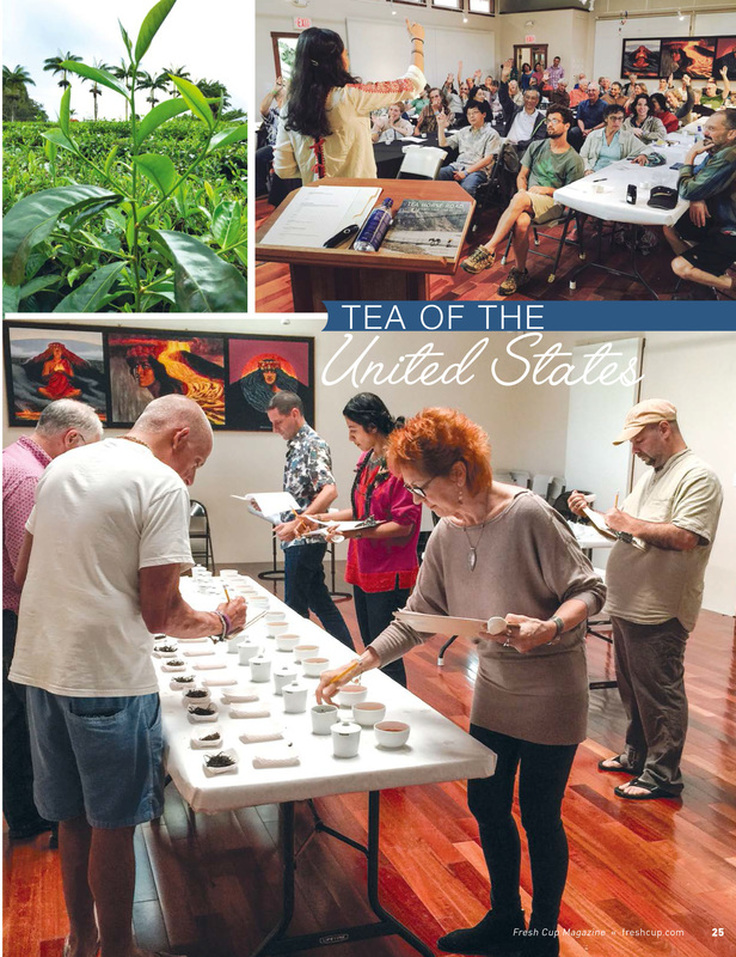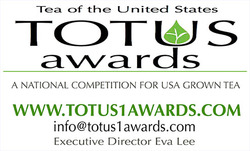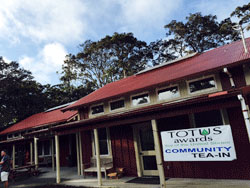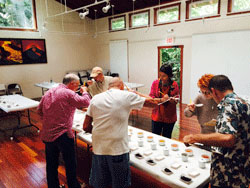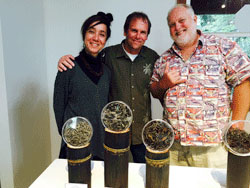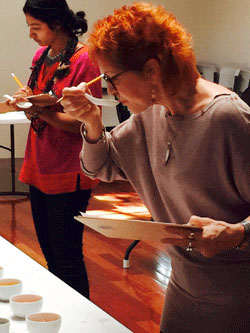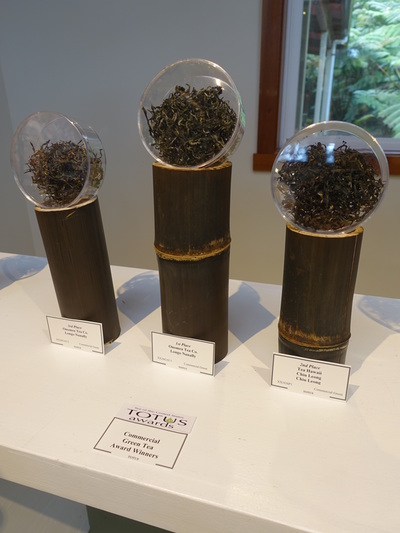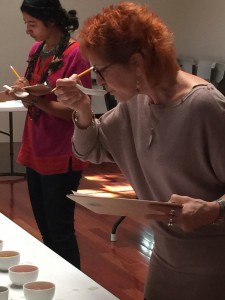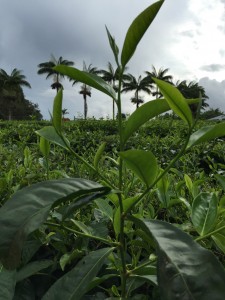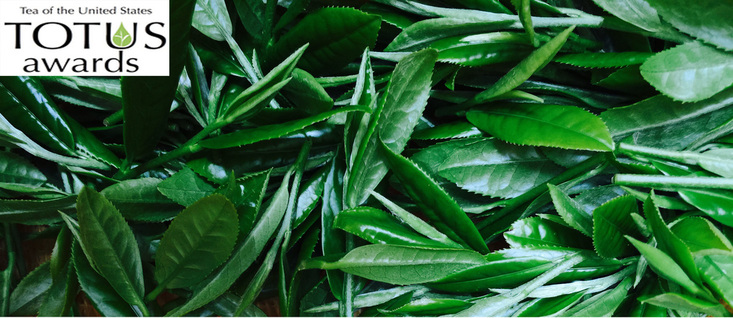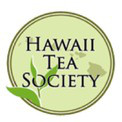Written by Kevin Gascoyne
At the TOTUS AWARDS in Hawaii last month, American tea had its first taste of appraisal. Kevin Gascoyne writes about the judging process, and the major push to put US-grown tea on the map...
At the TOTUS AWARDS in Hawaii last month, American tea had its first taste of appraisal. Kevin Gascoyne writes about the judging process, and the major push to put US-grown tea on the map...
In recent years we have seen a few international tea competitions held in the United States—that is competitions for teas from all over the world—but nothing specific to the teas grown by this burgeoning industry of its own soils. As part of an effort to encourage and recognize US tea, tea farmer Eva Lee, who lives on Hawaii’s Big Island, spent the last two years putting together the very first TOTUS Awards (Tea of the United States). The event was held in Volcano Village, Hawaii, at the beginning of November. It’s no small challenge for a farmer like Lee to keep business going while producing a project of national significance.
Recent years have seen an increasing number of American growers in many states approaching tea as a serious cash crop, despite the tough economics of growing and transforming tea in the States. Hawaii is currently the US region with the greatest number of tea growers, both artisanal and commercial, so holding the first TOTUS event on the islands seemed fitting. On a practical level, their collective voice now attracts a more supportive level of federal and state support, which helped not only fund the event but also put Hawaii-grown tea on the map as a viable agricultural product.
The principal goals of this showcase of American leaf were to both motivate necessary support for this growing industry on local, county, state, and federal levels and to encourage demand for these specialty teas in this rapidly growing sector. This community event also offered an ideal forum for the discussion of the many issues faced by such a young industry and the directions needed to move all its growers towards a sustainable future. Advantages of such competitions have been seen in other tea growing regions such as the well-established Luku Competition of Taiwan or the Nilgiri Specialty Auctions.
Encouraging growers from all over the States to enter their teas had been a serious challenge requiring long evenings of reassuring phone calls. But on the morning of judging, seventy-nine teas had arrived from thirty growers on the mainland as well as the islands. A full room of tastings was set up in eight categories, each on a separate table: commercial white, green, oolong, and black and non-commercial white, green, oolong, and black.
RECENT YEARS HAVE SEEN AN INCREASING NUMBER OF AMERICAN GROWERS IN MANY STATES APPROACHING TEA AS A SERIOUS CASH CROP...
The judges joining me were a collection of tea folk, including tea-author Jane Pettigrew, tea author and publisher Bruce Richardson, tea scientist Selena Ahmed, David De Candia of the Coffee Bean & Tea Leaf, and the tea-wise chef Stephen Rouelle. We sat down before the competition to discuss the methodology of the tasting in detail and agreed on the importance of leaving constructive comments as to the marketability of each tea to be made available to the grower of each entry. Each tea was scored on
•color of liquor
•aroma of liquor
•quality of dry leaf
•flavor
•mouth-feel
The whole process was completely blind and a side from the clinking of porcelain and some healthy slurping, the judges worked in silence until each table of entries was judged, only to discover the final results once they were released publicly. Throughout the tasting there was a constant hum of potential in the leaf material, an impressive level of expertise in manufacture, and many very original highlights. Though, we found out later, a large proportion of the teas were from Hawaiian growers, a few had been flown in from the mainland—some of those among the winners.
Following the day of judgment, various field visits had been arranged and a roundtable summit with the Hawaii State Department of Agriculture, United States Department of Agriculture, Agricultural Research Service, Daniel K. Inouye of the US Pacific Basin Agricultural Research Center, the College of Tropical Agriculture and Human Resources at the University of Hawaii Manoa, and Hawaii Farmers Union United.
Subjects discussed turned around the importance of cooperation and mutual support, the tension between relative inexperience and the costs of production, and how high-quality, specialty tea would be the essential path to justify a viable price point against teas from traditional regions. Other more Hawaii-centric issues of identity and brand-building were also examined by the panel.
A fourth day of awards and conferences was launched by a short and encouraging address from senators Mike Gabbard and Russell Ruderman of the Hawaii State Senate’s Water, Land, and Agriculture Committee. Start to finish the event atmosphere was of pleasant optimism for an industry facing many obstacles but with enormous potential to flourish and grow. Hopefully, this will add energy to the American-grown tea movement and will be the first TOTUS Awards of many.
Article source - Fresh Cup Magazine
Written by Kevin Gascoyne
Recent years have seen an increasing number of American growers in many states approaching tea as a serious cash crop, despite the tough economics of growing and transforming tea in the States. Hawaii is currently the US region with the greatest number of tea growers, both artisanal and commercial, so holding the first TOTUS event on the islands seemed fitting. On a practical level, their collective voice now attracts a more supportive level of federal and state support, which helped not only fund the event but also put Hawaii-grown tea on the map as a viable agricultural product.
The principal goals of this showcase of American leaf were to both motivate necessary support for this growing industry on local, county, state, and federal levels and to encourage demand for these specialty teas in this rapidly growing sector. This community event also offered an ideal forum for the discussion of the many issues faced by such a young industry and the directions needed to move all its growers towards a sustainable future. Advantages of such competitions have been seen in other tea growing regions such as the well-established Luku Competition of Taiwan or the Nilgiri Specialty Auctions.
Encouraging growers from all over the States to enter their teas had been a serious challenge requiring long evenings of reassuring phone calls. But on the morning of judging, seventy-nine teas had arrived from thirty growers on the mainland as well as the islands. A full room of tastings was set up in eight categories, each on a separate table: commercial white, green, oolong, and black and non-commercial white, green, oolong, and black.
RECENT YEARS HAVE SEEN AN INCREASING NUMBER OF AMERICAN GROWERS IN MANY STATES APPROACHING TEA AS A SERIOUS CASH CROP...
The judges joining me were a collection of tea folk, including tea-author Jane Pettigrew, tea author and publisher Bruce Richardson, tea scientist Selena Ahmed, David De Candia of the Coffee Bean & Tea Leaf, and the tea-wise chef Stephen Rouelle. We sat down before the competition to discuss the methodology of the tasting in detail and agreed on the importance of leaving constructive comments as to the marketability of each tea to be made available to the grower of each entry. Each tea was scored on
•color of liquor
•aroma of liquor
•quality of dry leaf
•flavor
•mouth-feel
The whole process was completely blind and a side from the clinking of porcelain and some healthy slurping, the judges worked in silence until each table of entries was judged, only to discover the final results once they were released publicly. Throughout the tasting there was a constant hum of potential in the leaf material, an impressive level of expertise in manufacture, and many very original highlights. Though, we found out later, a large proportion of the teas were from Hawaiian growers, a few had been flown in from the mainland—some of those among the winners.
Following the day of judgment, various field visits had been arranged and a roundtable summit with the Hawaii State Department of Agriculture, United States Department of Agriculture, Agricultural Research Service, Daniel K. Inouye of the US Pacific Basin Agricultural Research Center, the College of Tropical Agriculture and Human Resources at the University of Hawaii Manoa, and Hawaii Farmers Union United.
Subjects discussed turned around the importance of cooperation and mutual support, the tension between relative inexperience and the costs of production, and how high-quality, specialty tea would be the essential path to justify a viable price point against teas from traditional regions. Other more Hawaii-centric issues of identity and brand-building were also examined by the panel.
A fourth day of awards and conferences was launched by a short and encouraging address from senators Mike Gabbard and Russell Ruderman of the Hawaii State Senate’s Water, Land, and Agriculture Committee. Start to finish the event atmosphere was of pleasant optimism for an industry facing many obstacles but with enormous potential to flourish and grow. Hopefully, this will add energy to the American-grown tea movement and will be the first TOTUS Awards of many.
Article source - Fresh Cup Magazine
Written by Kevin Gascoyne
